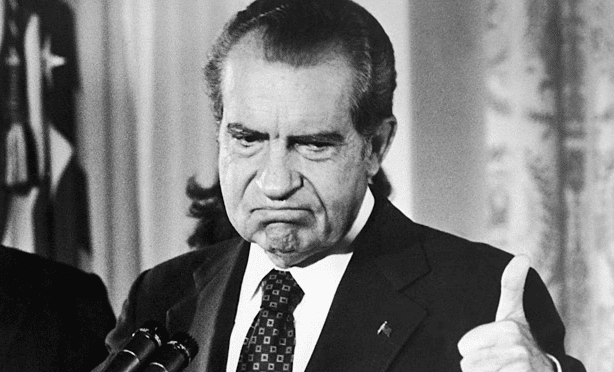The answer to high out-of-network health care costs is not to increase the federal government’s already excessive powers over the marketplace.
On a hot summer night—Sunday, August 15th, 1971—millions of red-blooded Americans tuned their Zenith and Magnavox TV sets to NBC to watch another action-packed episode of Bonanza, the popular Western starring Lorne Greene. Alas, they were destined for disappointment.
Days earlier, secluded at Camp David, President Richard M. Nixon and his closest advisors had decided to unleash a series of bold new economic policies on the American people, and only a prime time audience could do justice to the historic occasion. In his nationwide address, Nixon would partially revoke the famous “gold standard,” impose a 10 percent surcharge on all imports, and most ominously, subject all prices and wages in the United States to a 90-day “freeze.”
Sadly, it seems some Republicans in Congress have not read their economic history books.
That’s right—Richard Nixon, alleged conservative and free marketeer, was about to inflict unprecedented governmental micromanagement on the US economy. Eventually, the 90-day controls would be extended into 1974, and economic Big Brother would be institutionalized in the form of a “Cost of Living Council,” a “Pay Board,” and a “Price Commission.” Salaries, rents, and wholesale and retail prices were now in the incompetent hands of Uncle Sam.
The medium-term objective of Nixon’s capitalist apostasy was achieved: The economy surged in late 1972, just in time to ensure Nixon’s re-election. He won 49 out of 50 states. For Nixon—and for America—it was all downhill from there.
Price and Wage Controls
Nixon’s price and wage controls were primarily designed to stifle inflation, which in the free-spending Vietnam War era was heating up. The controls worked, but only temporarily. Inflationary pressures soon bubbled over, and when the controls were abandoned in 1974, it was because the lid had already come off: Inflation was at 12 percent. The budget deficit was about to explode.
The rest of the 1970s became a sad chronicle of “stagflation”: low economic growth, high unemployment, and runaway inflation—all combined in a heady cocktail of despair. Price controls over gasoline would be retained a little longer, producing widespread shortages and long lines at the pump. The lesson seemed clear: price and wage controls of the sort pioneered by Nixon were both un-American and utterly ineffective.
Sadly, it seems some Republicans in Congress have not read their economic history books. They are now considering a revised form of price controls in an economic sector ripe for governmental mismanagement: health care.
The key question is: Do you allow the free market to operate or not? For Senator Alexander, it’s a clear and resounding “no.”
Tennessee Senator Lamar Alexander has proposed a bill called the “Lower Health Care Costs Act,” which would cap out-of-network costs for medical care at federally curated rates. The goal is to eliminate “surprise” bills for insured patients who stumble (sometimes literally) into out-of-network hospitals to receive emergency care.
Senator Alexander should be commended for trying to help ordinary Americans deal with outrageous and sometimes crippling medical bills. Unfortunately, his proposed solution could blow up the very health care system he intends to save.
Responding to concerns from fellow Republicans, the senator recently penned an op-ed claiming his bill doesn’t impose Nixonesque price controls. “This bill does not allow the federal government to set the rates doctors and hospitals are paid”, he wrote. “The free-market will set the price which reflects the cost of providing care in that local area.”
Benchmarks Failed
Senator Alexander seems to be suggesting that because his “benchmarks” are based on median in-network rates, they should not be considered price controls. The trouble with this reasoning is that historically, price controls have always been based on someone’s idea of a “fair,” data-driven cost basis. The key question is: Do you allow the free market to operate or not? For Senator Alexander, it’s a clear and resounding “no.”
In the end, Alexander’s “benchmarks” will produce the same, equally devastating results as Nixon’s price controls. Not only will the Lower Health Care Costs Act favor insurance companies over doctors and hospitals, potentially reducing choice for patients and competition in general, but it will also subject the health care industry to a new and frightening level of government supervision.
Surely, the answer to high out-of-network costs is not to increase the federal government’s already excessive powers over the health care marketplace.
Federal meddling in the health care marketplace already causes many of the inflationary pressures that have throttled insurance companies, employers, patients, doctors, and hospitals alike for decades. Instead of reducing prices for patients, as the bill intends, once inflationary pressures catch up with us, it could overwhelm the system. That’s certainly the result we would predict if we reviewed the economic misadventures of President Nixon. In this case, the winners will be massive health insurance companies, and the losers will be American consumers.
Surely, the answer to high out-of-network costs is not to increase the federal government’s already excessive powers over the health care marketplace. Instead, it is to allow free-market solutions to emerge. Some have suggested that an approach based on arbitration rather than top-down price controls could be the key.
Senator Alexander—you and your colleagues in Congress should study the stagflation and economic malaise of the 1970s. It was a direct result of the “good intentions” of President Nixon and his advisors, who thought they were smarter than the free market itself.
They were wrong.
Please don’t repeat their mistakes.
Reprinted from the Future of Economic Education.






























